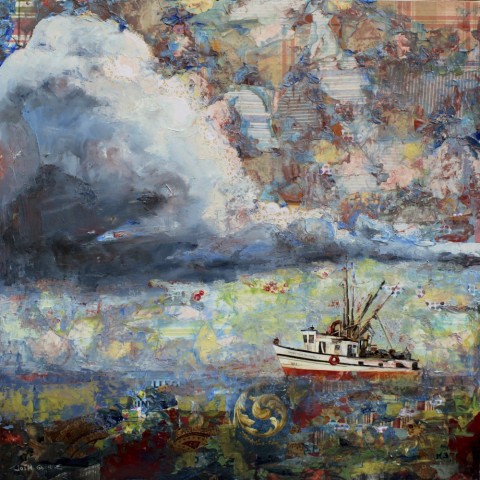Five drinks into the night, Ben decides that the movie is shit. Loud enough for the whole party to hear. Ocean Man pulls Ben into their marble white kitchen and points out that nobody’s forcing Ben to watch. Ben pours himself another, what was it, Earl Grey and vodka, and says that it’s the spear-fishing montage he objects to the most. Ocean Man was in that life raft for four days. Out of what materials would he have fashioned a spear? Sure, Ben has heard of driftwood, but that far out in the Gulf of Mexico? Where would Ocean Man have found a knife to carve the wood with? How would he have taught himself to spearfish, anyway?
“It’s based on a true story,” Ocean Man says. “They needed action. Suspense. Hallmark Channel doesn’t want eighty-eight boring minutes of me clinging to an inner tube and just the two minutes at the end of helicopters overhead.”
Ben’s not listening. He tilts back his head, empties his glass. He says, “And I don’t like what they did with my character.”
Ben is Ocean Man’s husband, but there is no Ben in this movie. The character of Ocean Man isn’t even gay in the movie. A network executive called Ocean Man early on to propose this change, and when he hesitated, she explained that the network thought a straight lead would be more relatable. She’d already settled on James VanDerBeek, which was flattering: VanDerBeek was sixty pounds lighter than Ocean Man. VanDerBeek wasn’t balding. Ocean Man knew that Ben would prefer to put this whole story behind them, and he told the network executive as much, but then the network executive went on to describe the kickback Ocean Man would receive—enough that he and Ben could finally move to the city and start paying off student loans. Since that call, the network has been nothing but kind. For his big premiere, they’ve sent Ocean Man two gifts: an autographed headshot of James VanDerBeek and an extra spear from the props department, placed in a shadow box.
“It never ends,” Ben said when the delivery interrupted their brunch that morning.
“One more night,” Ocean Man said. “Be patient for one more night.” But he stared down when he said it, making what looked like eye contact with his hour-old chocolate chip pancake on the table below.
He’d wanted all that syrup, but the pools of it had glazed over.
Now, Ocean Man leaves Ben in the kitchen of their loft apartment and switches on the television in their pile carpet bedroom, where he can watch free of running commentary. James VanDerBeek, seated comfortably in his life raft, is using his spear to remove the skin from a salmon fillet that he will presumably eat raw. Someone calls out for Ocean Man from the living room. A drink’s been spilled. The floor out there, thank God, is hardwood. Ocean Man fetches napkins from the kitchen, where Ben is pouring himself sip-sized drinks. Ocean Man, hands and knees, lets the stack of napkins do its work and sop up the spilled cocktail. The thing is, it had been Ocean Man’s honeymoon cruise. Ocean Man had gotten drunk on well whiskey at the casino bar and complained to the bartender that after only three days being married, he and Ben had already run out of things to talk about. He’d thought getting married would make things OK, make things permanent like writing in pen instead of pencil, but maybe they’d been impulsive. Maybe getting married required heroic levels of stupidity from both parties. He chugged at least seven drinks. In interviews, Ocean Man neglects to mention that he’d been drinking before going overboard, so people are curious. He blames his fall on pure clumsiness, on his notoriously low blood pressure, but is it possible he jumped?
Either way, going overboard brought nothing but benefits to Ocean Man. A month after the rescue, there was a People magazine cover. A month after the cover, a Sixty Minutes interview, in which he admitted that things with Ben had been tense but refused to be more specific. Later, through knowing someone who knew someone, Ocean Man, jobless former law student, parlayed his fame into a career with a firm that represented Adventure Island, a water park tangled up in a dozen high-profile lawsuits, the result of as many waterslide-related injuries, and the firm’s strategy? Deny. Deny vigorously. Friends from the firm inspect Ocean Man’s prop spear now, which he’s hung on a living room wall dedicated to Ocean Man memorabilia.
“That really happened?” someone asks. “You did all that spear fishing?”
Ocean Man says, “I’ve got the spear to prove it, don’t I?”
“Good thing you and Ben weren’t getting along,” says somebody else. “I mean, it isn’t, but it gave you a story.”
Stumbling Ben slumps in from the kitchen and hurls his phone toward the Ocean Man wall. It grazes an ear. It knocks off the framed People cover and silences the room. The party politely begins to disperse. Ben apologizes to Ocean Man’s colleagues; he tries to sound sincere, but by this point, there’s broken glass on the floor. He retches. He says, “Jesus Christ, my throat tastes terrible.”
Ocean Man offers an excuse me to those too stunned to leave the loft and promptly escorts Ben to the bathroom. He points down at the shag rug that’s contiguous with the toilet. “Just to be safe,” Ocean Man says, “since your face is green.”
Bent over the toilet, Ben slurs, “I’m trying to be professional, but you’re my best friend, so I should tell you: they didn’t get it right at all.”
“But they got close,” Ocean Man says. “You know you’re embarrassing yourself?”
Ben lurches like ebb and flow. He says, “You never spearfished. You couldn’t have. You lied out there. You lied to your friends.”
Ocean Man reaches over and prematurely flushes the toilet.
“No,” he says. “No, Ben. I didn’t.”



 In September 2022 SmokeLong launched a workshop environment/community christened SmokeLong Fitness. This community workshop is happening right now on our dedicated workshop site. If you choose to join us, you will work in a small group of around 15-20 participants to give and receive feedback on flash narratives—one new writing task each week.
In September 2022 SmokeLong launched a workshop environment/community christened SmokeLong Fitness. This community workshop is happening right now on our dedicated workshop site. If you choose to join us, you will work in a small group of around 15-20 participants to give and receive feedback on flash narratives—one new writing task each week.